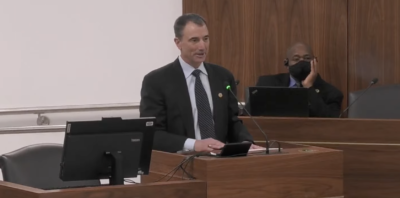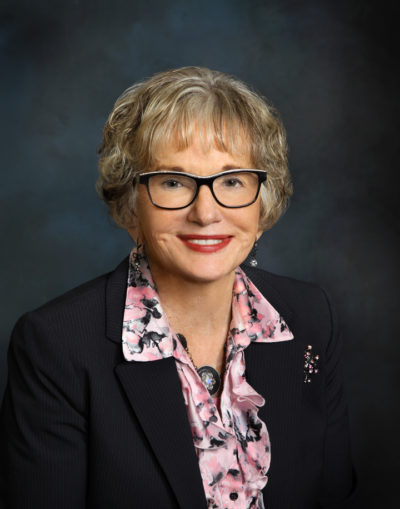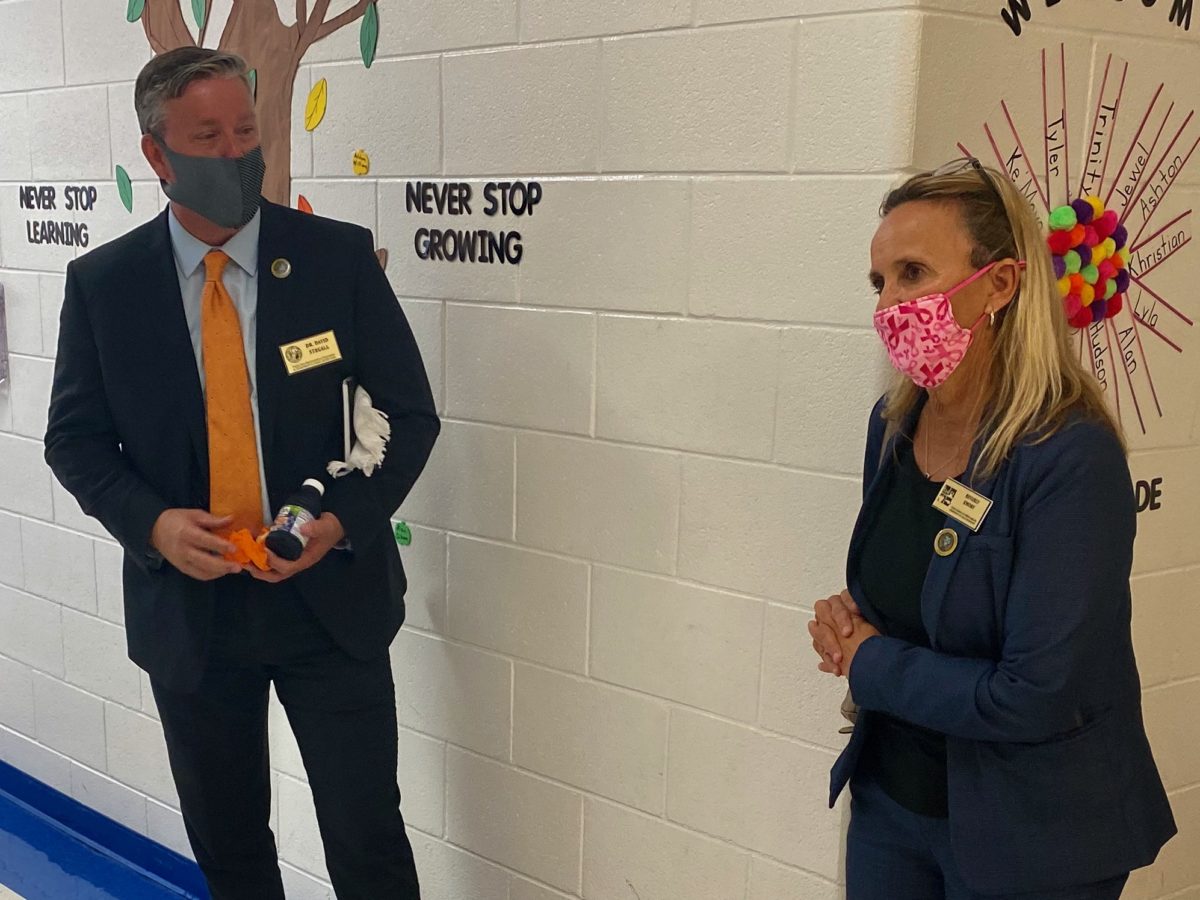
The world had faced potential pandemics before. SARS in the early 2000s. H1N1 a few years later. They caused damage, but not the far-reaching disaster some predicted. So, when David Stegall, deputy superintendent of innovation at the state Department of Public Instruction (DPI), heard about COVID-19, he didn’t know what to think.
In early March, the virus was making its way to North Carolina. The state had seven cases, five of which stemmed from a Biogen corporate conference in Boston the month before.
Stegall remembers that districts and universities were coming back from spring break and that DPI was starting to get calls from local education leaders wondering if COVID-19 was going to affect them.
According to this News & Observer article from that time period, there were 423 cases in the United States and 19 deaths as of March 9.
On Saturday, March 14, Stegall was summoned to the emergency operations center. He knew that Gov. Roy Cooper was going to announce that schools were closing for at least the next two weeks. He also knew there was going to be a task force formed, and part of it was going to include an Education and Nutrition Working Group. He even knew they wanted someone from DPI helping head it up. He just didn’t know that somebody was him.
The press conference that Saturday was when Stegall started to get a sense of what the true impact of COVID-19 could be.
“That’s when it kind of hit me. This is much bigger than even I thought it might be,” he said.
Bev Emory was deputy superintendent for district support last March. She said that leading up to Cooper’s press conference, DPI had been getting questions from the field — concerns about what would happen if there were some sort of lockdown or quarantine.
She said her first real tip about where things were going came the Wednesday before. Digital teaching and learning was one of the divisions under her and the discussion was starting to turn to what the division needed to do if suddenly schools went online.
On Friday, March 13, one day before Cooper’s press conference, Emory participated in a webinar where a new site with digital resources was unveiled. She said she thinks staff worked 48 hours straight to come up with that site so that people in the field would have something to access if schools were closed.
At the end of that day, everybody at DPI was told to take their stuff home in case they couldn’t come back to the office on Monday.
Emory thinks of herself as the “infrastructure lady.” Her mind was already moving to what kind of supports were going to be needed for DPI and districts. She had a lot of questions.
“How do we pull this off within this new environment? What does this look like? Who do we need to be involved in this?” she asked.
On March 14, Cooper closed schools for two weeks. On March 23, he extended the school closures. And on April 24, he announced they would be closed the rest of the year.
Through the spring, into the summer, and even now, Stegall and Emory helped lead DPI’s response to the pandemic, working to get virtual learning supports up and running, coming up with templates, guidelines, and scenarios for schools to reopen in the fall, and supporting districts as they juggled the various plans for schools at the start of the 2020-21 school year.
The two joined DPI just about a year before the start of the pandemic and had no sense at the time how much more of a responsibility they would soon bear.
This is their story.
Who are Stegall and Emory?
If you don’t pay a whole lot of attention to the goings on at DPI, then it’s possible you’ve never heard of either Stegall or Emory. They’re both relatively recent additions to the DPI staff with rich education histories in the state.
Emory’s hiring at DPI was announced in February of 2019, though she didn’t start her new position until some months later. She was leaving her post as superintendent of Winston-Salem/Forsyth County Schools, which she had been hired to lead in 2013 according to this article from the Winston-Salem Journal. She was the first woman to hold the position since the county and city school systems merged in the 1960s. Before that, she had been superintendent of Pitt County Schools since 2006. According to a press release from DPI, she had also been a principal, administrator, and teacher.
When she came onboard at DPI, she was director of district regional support. She took over as deputy superintendent of district support in June of 2019 when Maria Pitre-Martin left DPI for a position in Virginia.
Most recently, in August of this year, Emory was put in an executive role at DPI to work on fulfilling the priorities of the Leandro court case.
In March of 2019, Stegall was named the deputy superintendent of innovation at DPI. He started in June of that year.
According to a press release from DPI, Stegall came to the department from Dubai, UAE where he was superintendent of U.S. Curriculum Schools for GEMS Education. He wasn’t a stranger to North Carolina, however. He had previously worked as superintendent of Newton-Conover City Schools, was named regional Superintendent of the Year in 2017, and worked as a teacher in Rowan-Salisbury Schools and Iredell-Statesville Schools.
It was announced recently that an equity office will be added to DPI and it will be under Stegall as deputy superintendent of innovation.
Getting through the beginning
“One of the beautiful things about our brother/sister relationship is this huge commitment to getting those folks out there what they need,” Emory said of herself and Stegall.
That relationship continues to this day, as the two regularly go out across the state to meet with school district leaders, teachers, and students.
When the two started their positions at DPI, Emory said that Stegall had the idea that they should meet regularly with all of their division leaders together as a group. That idea preceded COVID-19, but it was one that proved valuable as the pandemic started wreaking havoc and DPI started forming work groups to deal with all the potential implications of the virus.
Emory said there were 12 work groups in that initial phase when DPI was just trying to get the state’s schools through the spring semester.
Still, initially, everyone thought the situation was temporary.
“I guess at the beginning of the crisis … we had that first window when we were all optimistic that we would return,” Emory said.
Stegall echoed her sentiment about the hope of the early days. He said the goal then was to figure out how to mitigate the damage of what they hoped was a short period of time away from classrooms. There was consideration of extending the school year. Questions about annual school events. Basically, they were focused on the short-term problems.
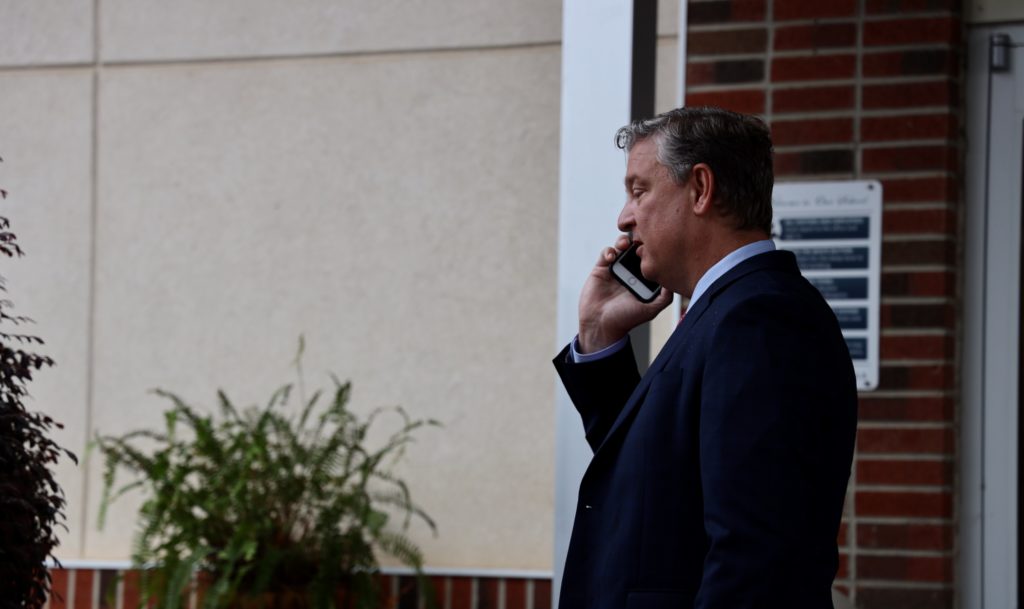
Stegall said he has worked a lot in the western part of North Carolina, and the thinking then was similar to how education leaders might think about dealing with snow or ice storms.
“What do we need to reschedule? How do we need to respond to adapt to the lost days?” he asked. “We very much were anticipating … in two weeks or whatever it may be, we’re going to have to make up some days.”
Emory said that first period of time was just about crisis management. How can the state prepare to come back and finish out the school year?
They knew legislative changes would be needed since state law dictates when school can end for the year. Leaders were trying to figure out if the State Board of Education would have to make other policy changes.
And at the beginning, it also seemed like the state response might not be uniform across all districts. Early cases were focused in the Research Triangle area, Stegall said.
“Early on it really felt like we might have two responses,” he said. “One for the affected counties and one for those not affected.”
But soon, the number of cases grew and began to encompass more of the state. Before too long, Stegall said it seemed like the whole state was being affected.
“That’s when you realize this isn’t going away any time soon,” he said. “That’s when the discussions around containment became a big part of the conversation.”
By April, it was clear schools weren’t coming back for in-person learning, and Emory, Stegall, and the rest of DPI and the State Board of Education were in a tough spot. They don’t control the purse strings and they don’t make the laws, but districts needed money and they needed relief from legislative mandates. Emory said what DPI could do was communicate.
“We may not be able to control money or whether they got the PPE (personal protective equipment) they need, but we can return their calls, and we can figure out what they need and be a voice for them,” Emory said.
As they fielded phone calls from around the state, one of the things that became clear was that traditional school districts and charter schools had different needs.
Emory and Stegall began to have regular phone calls with charter school leaders, as well as with traditional district superintendents and public information officers.
Jack Hoke, executive director of the North Carolina School Superintendents’ Association, said that Emory and Stegall were good about making sure superintendents got the information they needed. He said that if Stegall and Emory didn’t know an answer to a question, they would find it and get back to superintendents. He said they couldn’t do everything superintendents wanted or needed, but what they could do, they did do.
These points of communication are important and continue to this day, Emory said. And, she said, even in the absence of a pandemic, they should continue.
“I do believe if there’s one thing that we’ve been good at it’s been communication during this crisis,” she said. “We can’t control the virus, we don’t make the decisions for local districts … but we do have control over communication.”
And, of course, the questions were pouring in from media, schools, and others, Stegall said. What about dances? Sports championships? Graduation ceremonies?
“We’re very much a society that revolves around major events, whether that be spring break or end of school or prom … they were all going to be changed now,” he said.
The number of people that needed to be brought in to deal with all of the issues began to grow and grow.
Stegall said it started with about 20 and grew to 100 or more, covering topics from child care to transportation to food. And none of them could be handled in isolation, because they all represented aspects of a community as a whole.
“If I’m struggling and I have tons of resources … how are those families and students in particular … how are they handling this?” Stegall said he asked himself. “It kind of starts weighing on your emotions.”
Stegall said they were all working for days on end with no break in sight.
“You very much react with adrenaline and just that will of wanting to help,” he said.
And throughout the spring, that’s what they did. Schools did not come back for in-person learning. DPI and the State Board advocated for resources to combat the pandemic from the General Assembly. K-12 education ended up receiving about $231.6 million in federal aid through the General Assembly in May. DPI helped the State Board of Education navigate how grades would — or wouldn’t — be handed out in the spring. The Board and DPI sought exemptions from laws requiring standardized testing, and received it. They figured out graduation and adjusted to remote learning as best as possible.
By the end of the year, discussions were turning to summer and fall. Stegall, Emory, and others were talking about Jump Start, a summer program to get kids back on track before the fall. Everybody was very optimistic about the 2020-21 school year.
“We fully anticipated that would be the beginning of a face-to-face school year,” Stegall said.
Summer brings more challenges
Stegall said that going into the summer, most people were still expecting things to turnaround. There was a hope that the heat of the summer and people not being in school might cause COVID-19 numbers to dwindle. Maybe the worst was behind them.
They started having conversations about moving up the start of the school year or even extending school days to make up for the time lost in the spring.
And they already had to start considering year-round schools and sports that started practice over the summer, like football. Emory said she remembered her and Stegall meeting with Department of Health and Human Services (DHHS) staff and Stegall pointing out that if football was canceled, most other sports would be too. Without the gate revenue that football provides, schools wouldn’t be able to afford the less-popular athletic activities.
And then there was a question of what standards football players would be held to when it came to COVID-19 precautions.
“If you’re going to have football practice and you’re going to let kids get on an activity bus, are you going to have the same standards for six feet in July that you anticipate you’re going to have in August?” Emory said. “These are the kinds of things that literally took hours and hours of time.”
Emory also recalls that early on in the summer, there were even discussion with DHHS about whether or not different regions in the state would be able to open under different restrictions.
But that became less likely after Cooper announced three possible plans for all schools to prepare for in the fall: opening basically as normal, opening fully remote, or opening under a hybrid model. He was slated to make an announcement about which plan the state would choose July 1. But that didn’t happen.
Stegall said that as COVID-19 numbers were rising throughout June, and then when Cooper was supposed to make a decision and didn’t, he realized things might not end up going as hoped in the fall.
“That was when the real possibility that we might not start face-to-face started to creep into the discussion,” he said.
It was a tough realization. Stegall thought back to when the pandemic was first starting. Back then, August seemed way in the future. He remembered being in a meeting and someone mentioning that it was an election year. The person wondered if COVID-19 would impact people going to the polls.
“That’s silly. That’s in November. There is no way this could be around in November,” Stegall remembers thinking. “There is no way this is going to happen.”
Emory, Stegall, and others worked over the summer to prepare a guidance document that helped districts navigate the various plans they might open with in the fall. When Cooper finally announced in July that schools could open under a hybrid model or a remote-only mode, they updated the guidance from DPI and the State Board.
Finally, in August, schools opened. Most students in the state started in remote-only environments. But gradually, more and more schools have allowed students to come back to classrooms in some capacity. In September, Cooper announced that elementary students could come back to school in-person full time if districts desired.
Stegall said the beginning of the school year leading up to now has been pretty positive.
“Everyone, I think, recognizes the challenges that exist. That schools have to look different for the time being,” he said. “I do see that most places are doing the glass half-full approach.”
Emory is also positive about how the school year is going.
“I think it’s going remarkably well given all the uncertainty,” she said.
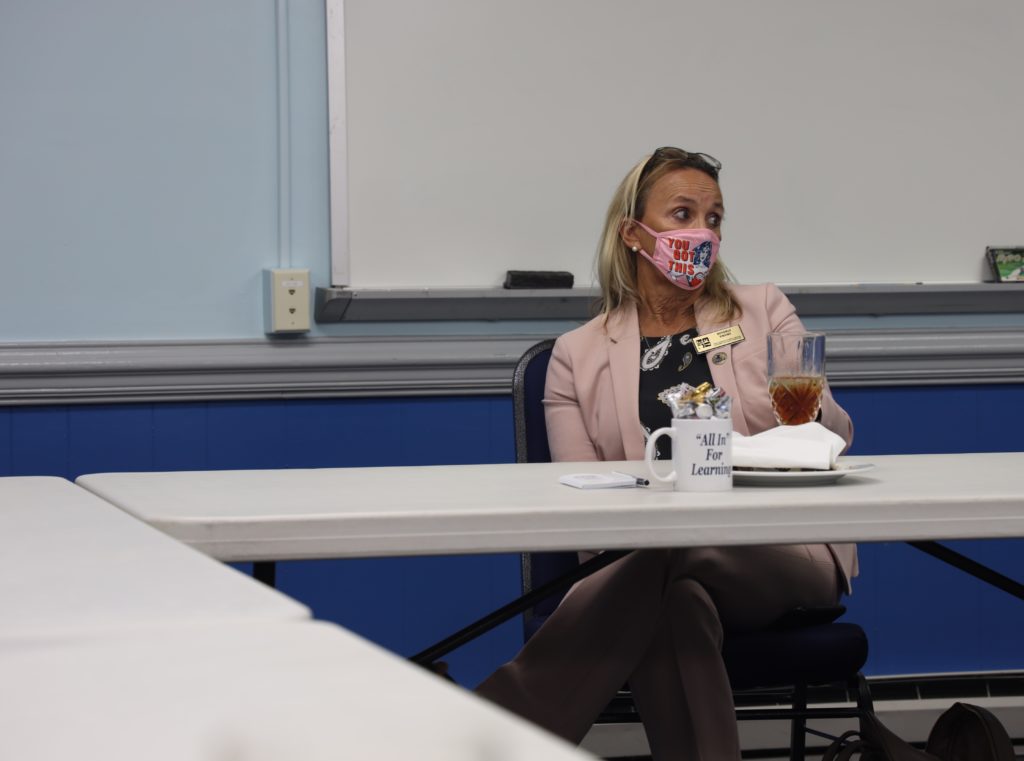
The view at home
There has been a lot said about the challenges facing teachers and parents as they have had to navigate numerous personal challenges while also dealing with their professional responsibilities. The same is true for the leaders making the decisions that impact parents’ lives.
Emory was dating a man named John Britton when COVID-19 hit. He was a schools attorney in Ohio. When it became clear that the pandemic was going to make the long-distance relationship difficult, he came down to North Carolina and they quarantined together. In September of this year, they got married.
He said he’s had a lot of admiration for how she’s handled herself as she helped lead the state’s public schools through the pandemic.
“She’s done a terrific job of keeping her wits about her. But there has been a lot of frustration. And it’s exhausting,” he said. “At the end of a work week, she’s pretty much spent.”
Even when the day is done, the day is not done for her. Britton said he’s never seen Emory turn down a phone call.
Manda Stegall, David’s wife, said when Cooper named Stegall as co-chair of the Education and Nutrition Working Group, she knew what that meant: being accessible 24 hours a day, seven days a week.
But she also said that Stegall has never been one to avoid work. Stegall’s mother lived with them for two years after her husband passed, and every day around 5 in the evening she would ask where Stegall was. Manda had to explain that 5:00 wasn’t quitting time for him.
“David’s never been one who’s been home by 5:30 or even before dark,” she said.
And Manda gets it. She provides curriculum and instructional support for exceptional children in Newton-Conover City Schools, so she knows what it’s like to work in education.
She and their daughter, a senior in high school, live just outside of Hickory. Manda said that Stegall and she made the decision that if their kids wanted to stay in their high school, they would let them, no matter what it meant for the two of them personally. So, Stegall works in Raleigh during the week, living in a small apartment there.
Manda and her daughter were visiting Stegall in Raleigh the weekend that Cooper shut down schools for in-person instruction back in March. She and Stegall had been taking their daughter shopping for prom dresses.
“Now we have two dresses that haven’t been to a prom yet,” she said.
Because of the pandemic and Stegall’s work schedule, Manda and he weren’t able to go on vacation this summer. And his work hours meant seeing even less of him than normal. But she said she understood.
“This is just part of the job right now, and this is what it demands of him,” she said. “If you say yes to the job, you also have to say yes to all the other things that come with the job.”
She said there has definitely been an increase to the intensity of Stegall’s job. And the decisions he has had to make during the pandemic have had more far-reaching implications. Of course, along with that comes more criticism.
“We’ve gotten off of a lot of social media … people are just angry and they don’t always know who to be angry at,” she said.
Stegall said things aren’t as hectic now as they were early in the pandemic. Now, it’s more about strategic and long-term planning and less about crisis management. But life certainly isn’t back to normal. And he doesn’t think it will be, at least until there is a vaccine. Until then, he believes many families won’t be comfortable bringing their students back to school.
People sometimes ask Stegall what he would want to say to parents. He would preach mercy.
“We need to give grace to one another knowing we’re all going to make mistakes and have shortcomings through this,” he said.
For her part, Emory said she hopes some things, like the emphasis on communications, continue after the pandemic. She also hopes that this crisis has shone enough light on the inequities in broadband access that the state starts to do something about it.
“I think one of the silver linings here is the collective realization that this is a utility,” she said.
Her other takeaway from her experience thus far is gratitude for being able to be there for North Carolina educators in a time when they needed help.
“I’m just incredibly grateful to be in this place at this time, because if nothing else, I feel like I’ve been able to listen and to support and be an advocate for leaders who are out there doing the heavy lifting,” she said.
Recommended reading

